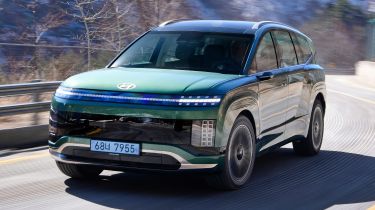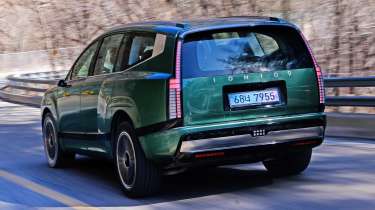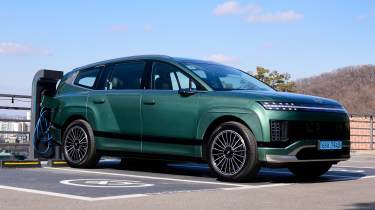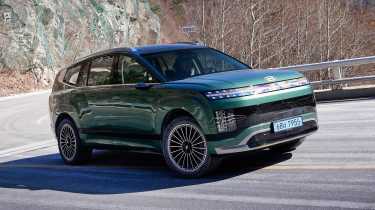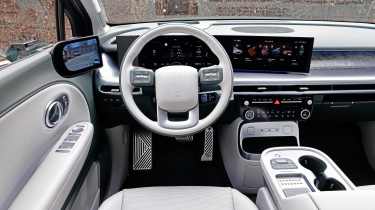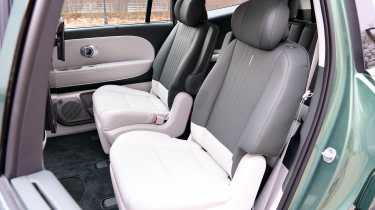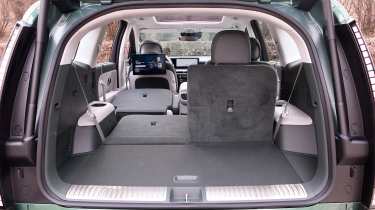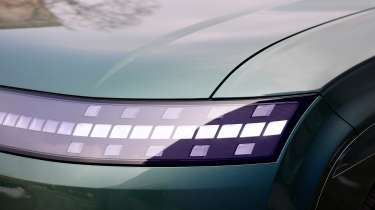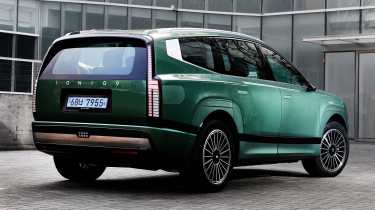Hyundai Ioniq 9 review – incredibly practical seven-seat EV with impressive range
“The Hyundai Ioniq 9 is a very refined, upmarket seven-seat EV with better range than a Kia EV9”
Pros
- Large battery for a long range
- Class-leading seven-seater practicality
- Very quiet and refined
Cons
- The ride is firmer than we’d like
- Performance variant isn’t sporty
- Infotainment isn’t as cutting-edge as rivals’
Verdict – is the Hyundai Ioniq 9 a good car?
The Hyundai Ioniq 9 is an incredibly big and practical seven-seater electric SUV that should be on your list if you have a large family. It’s very refined and quiet, while it feels more upmarket than Hyundais that have come before it. It’s let down somewhat by a choppy ride, and we don’t think the Performance variant feels particularly sporty, but it’s a welcome addition to the line-up and has an impressive electric range.
Hyundai Ioniq 9 models, specs and alternatives
The Hyundai Ioniq 9 is the latest in the South Korean brand’s impressive electric car arsenal, sitting at the top of the range as its largest EV SUV, complete with seven seats for maximum practicality. It’s the sister car of the Kia EV9, which is also a seven-seater electric SUV and a direct rival to the Ioniq 9.
The Hyundai Ioniq 9’s styling is somehow very estate-like, and at a quick glance we think it almost looks like a Volvo estate from the late 2000s. That’s partly because of clever styling including a black line a few inches from the bottom of the sills which surrounds the car, breaking up its tall SUV stance.
 The best 7-seater cars to buy in 2025
The best 7-seater cars to buy in 2025
At the front, the Ioniq 9 gets a minimalist design with square headlights which flow seamlessly into a black panel spanning the whole width of the car. At the rear there are tall tail-lights again reminiscent of those of a Volvo.
The Ioniq 9 comes with a larger battery pack than that of the Kia EV9 at 110kWh in size, compared with the EV9’s 100kWh unit. While the EV9 gets a smaller offering at 70kWh, the 110kWh battery is standard across the Ioniq 9 lineup. It supplies the Ioniq 9 with a range of up to 385 miles.
There’s a choice of power options, though. The entry-level car gets a rear-mounted motor that supplies the Ioniq 9 with 215bhp, but you can also specify an all-wheel drive model with dual motors and 309bhp. Go for the AWD Performance and power is boosted to a hefty 429bhp.
The Ioniq 9 is yet to come to the UK but is expected in Autumn 2025, and as a result trim levels are still to be confirmed. When we tested the Ioniq 9, the interior was one of the main highlights, though – it’s very modern with a great balance between virtual and physical controls.
The sheer space inside is impressive, and we think the Ioniq 9 is the best in its class in terms of practicality. You get the choice of six and seven-seater configurations, and unusually, the centre row always features two captain’s chairs, which makes them roomy and comfortable. Go for the seven-seater and the rearmost row is the one that gets the extra seat. The Ioniq 9’s boot is massive even when the third row is in place, which makes the Ioniq 9 impressively versatile.
| Trim levels | Power options |
|
|
Range, charging & running costs
| Pros | Cons |
|
|
The Hyundai Ioniq 9 is the brand’s largest electric car, and it gets the biggest battery offered by the brand, thanks to that massive footprint. It’s even bigger, in fact, than that of its sister-model, the Kia EV9.
Unlike in some EV car line-ups, the Ioniq 9 only gets one battery option, which is 110kWh in size. That supplies it with an impressive range on the rear-wheel drive entry-level model, though specifying all-wheel drive on the other two versions of the Ioniq 9 dents the range somewhat.
Charging speeds are impressive, so when you do need a top-up you can count on up to 350kW. That’s a class-leading figure, so if you can find a charging station with compatible speeds, you can top the battery up from 10-80% in just 24 minutes, despite its large size.
| Model | Battery size | Range |
| Ioniq 9 | 110kWh | 385 miles |
| Ioniq 9 AWD | 110kWh | 346 miles |
| Ioniq 9 AWD Performance | 110kWh | 329 miles |
What will the Hyundai Ioniq 9 cost to insure?
The Ioniq 9 is yet to get official insurance groupings, but it’s positioned as a more upmarket proposition than any of the brand’s other cars, and EVs can be expensive to insure, so we’d expect it to sit in a fairly high group.
Electric motor, drive & performance
| Pros | Cons |
|
|
The Hyundai Ioniq 9 may have some big power figures and even a Performance variant, but don’t expect it to be a particularly entertaining car to drive. We’d argue that the focus here isn’t really on that, but on driving ease. The Ioniq 9 is very simple to operate, and we like the fact that it’s easy to place on the road, so despite its large size it’s not as daunting to drive as you might expect.
The steering is very light and precise, which makes the car feel effortless, although that may not be the optimal calibration for driving satisfaction. A BMW iX will be more suited to you if your focus is on driving feel.
We tested the Ioniq 9 in AWD Performance guise, and despite that ‘Performance’ badge, it doesn’t feel particularly fast. What it does do is make the Ioniq 9 feel like a smaller, less cumbersome car than it is, thanks to the power being well suited to propelling the car’s weight around. While we’ve not driven it yet, we imagine the 215bhp single-motor version might feel a lot more sluggish as a result of its lower power.
If there’s any downside to the Ioniq 9’s drive, it’s that the ride is a little firmer than we’d like. It’s by no means uncomfortable, but it’s no match for the supple suspension setup of the Volvo EX90, which does a great job of smoothing out road imperfections. The South Korean roads on our test route were actually very smooth, and yet the Ioniq 9’s ride still wasn’t the best.
Is the Hyundai Ioniq 9 good to drive in town?
The Ioniq 9’s ride is rather firmer than we’d hoped, and that will be a challenge for it when it reaches UK shores, especially in urban environments where the roads can be full of imperfections and potholes. At least the Ioniq 9 gets lots of tech to make driving easier, such as side digital mirrors, and it’s very manoeuvrable at lower speeds with its light steering setup.
Is it good to drive on long journeys?
The Hyundai Ioniq 9 has a very usable range if you need an EV that can complete longer journeys before a charge. The cabin is well laid-out which should make it comfortable on a longer drive, and wind and road noise are kept to a minimum, meaning the interior is very serene while cruising along – this is thanks to insulated glass, aerodynamic wind mirrors and the Ioniq 9’s silent electric motors.
Is the Hyundai Ioniq 9 good to drive on B-roads?
The Ioniq 9 isn’t really designed to be a fun car to drive, even in Performance guise. Despite its large size, it’s very easy to place, which does make it reassuring to drive, but don’t expect its large power outputs to equate to driving thrills.
| Model | Power | 0-62mph | Top speed |
| Ioniq 9 | 215bhp | 9.4 seconds | 115mph |
| Ioniq 9 AWD | 309bhp | 6.8 seconds | 124mph |
| Ioniq 9 AWD Performance | 429bhp | 5.2 seconds | 124mph |
Carbuyer notes
“On the road, the general consensus of the driving experience is one of supreme ease. This is a big car, yet even with its digital mirrors and rising beltline, it’s easy to place on the road.” Jordan Katsianis, Senior Staff Writer
Interior & comfort
| Pros | Cons |
|
|
The Hyundai Ioniq 9’s interior is spacious and modern, building on what we’ve come to expect of the brand from some time now. Forget the image you have of Hyundai from a few decades ago, now it feels much more upmarket and civilised, with great build quality.
Is the Hyundai Ioniq 9’s infotainment and navigation system easy to use?
The Hyundai Ioniq 9 gets a dual 12.3-inch infotainment and driver’s display setup as used in the brand’s other models. It’s very easy to use, striking the right balance of features, staying simple enough that it doesn’t bewilder the user. There’s a good amount of customisation, although we wish the blind-spot camera view that you get on other Hyundai models was also available here. You do get side view cameras, with screens mounted on the door cars, at least, although using these can make it a little more difficult to gauge depth when changing lanes.
Hyundai’s own sat nav system is very good to use, but there’s also Android Auto and Apple CarPlay integration if you’d prefer to use that.
If we had any critiques of Hyundai’s infotainment system, it’s that it’s starting to look a little outdated up against some of the more recent tech on the market that makes use of larger displays that are crisper and more vibrant to look at. Still, we really appreciate the balance of physical and virtual controls in the Ioniq 9, and in this respect it’s ahead of rivals.
Is the Hyundai Ioniq 9 well equipped?
We’d expect the Ioniq 9 to be as well equipped as Hyundai tends to make its cars to help them stand out alongside the competition, although trim levels are not yet confirmed for the UK.
Key features | |
|
TBC
| |
Boot space, practicality & dimensions
| Pros | Cons |
|
|
Practicality is an area where the Ioniq 9 shines, because it’s one of the best packaged cars on sale. It’s available in either six or seven-seat configurations, with the second row available as a single bench with three seats or two captain’s seat chairs. Those seats are essentially two fully-independent comfy chairs which are more spacious and should keep rear occupants happy. The third row is admittedly tighter, but it’s at least easy to get to thanks to the spacious gap between the chairs in the middle row, and if you need extra space the chairs can be tilted forward easily via an easy-to-use switch.
In the front the Ioniq 9 is incredibly spacious, too. The flat floor helps make the Ioniq 9 feel very roomy, and the dashboard is completely separate from the centre console.
There’s a storage shelf above the glovebox, as well as two central cubby holes with three integrated USB-C charging ports above them. The centre console also gets a wireless phone charging pad. There’s a sliding draw that sits below the centre console which is also accessible to the middle-row occupants.
| Size comparison | |||
| Model | Length | Width | Height |
| Hyundai Ioniq 9 | 5,080mm | 1,980mm | 1,790mm |
| Kia EV9 | 5,015mm | 1,980mm | 1,780mm |
| Volvo EX90 | 5,037mm | 1,967mm | 1,744mm |
| Peugeot E-5008 | 4,971mm | 1,895mm | 1,694mm |
Does the Hyundai Ioniq 9 have a big boot?
With all three rows in place, the boot is still a massive 620 litres big. There’s space under the floor to store the charging cables, which leaves the main area clutter-free. If you drop the rearmost row, you free up a cavernous 1,321 litres, so the Ioniq 9 is very versatile indeed.
| Boot space comparison | |
| Model | Boot space |
| Hyundai Ioniq 9 | 620 litres |
| Kia EV9 | 333 litres |
| Volvo EX90 | 310 litres |
| Peugeot E-5008 | 348 litres |
Reliability & safety
| Pros | Cons |
|
|
Hyundai is a middling performer in the Driver Power customer satisfaction surveys. The brand finished in 17th place out of 32 manufacturers in the 2024 edition, with buyers rating it highly for low running costs, infotainment and value for money. They were less impressed with the brand’s exterior styling, fit and finish and interior cabin quality.
Reliability is respectable, with a slightly better-than-average 22.8% of owners reporting an issue within the first year of owning their Hyundai. Kia’s reliability is marginally worse, with 24.3% of Kia owners reporting an issue with their car, though overall customer satisfaction is higher, with that brand placing in third in the survey.
How safe is the Hyundai Ioniq 9?
The Hyundai Ioniq 9 is yet to be crash-tested by Euro NCAP, but the brand’s other electric Ioniq 5 received the full five-star rating with an impressive 88% in the driver assist category. For that reason we would expect the Ioniq 9 to fare just as well in that category as it shares lots of the same tech with its smaller sibling. It’s still yet to be seen how the Ioniq 9 will fare in the other crash-testing categories, but we’d be very surprised if Hyundai let it score any less than its sister-car the Kia EV9’s five-star rating.
What is the warranty on the Hyundai Ioniq 9?
Hyundai is somewhat famous for its impressive warranty. This lasts for up to five years with no mileage cap, whereas fellow South Korean brand Kia covers you for up to seven years or 100,000 miles. Toyota and Lexus offer a warranty of up to 10 years or 100,000 miles, though this is only renewed annually or within every 10,000 miles so long as you keep your car serviced via a main dealer. Other than that, most manufacturers tend to offer a warranty of about three years, which is starting to lag behind.
Should you buy a Hyundai Ioniq 9?
The Hyundai Ioniq 9 is one of those models which makes you realise how far the brand has come since its humble beginnings in the UK. While it may be expensive, it’s incredibly polished, offering a refined drive as well as class-leading practicality. Low running costs should make the Ioniq 9 a great choice for private and company-car buyers alike, especially if you have a home wallbox charger.
A range of up to 385 miles is impressive, and beats the Kia EV9 in this department, only adding to the Ioniq 9’s appeal. However, don’t expect lots of excitement, even in the AWD Performance variant, and unfortunately the first signs are that the Ioniq 9’s ride could be better. Still, we’ll reserve full judgement until we get to drive it in the UK.
What is the Carbuyer pick of the Hyundai Ioniq 9 range?
It’s too soon to give a definitive answer on which of the Ioniq 9 models is the best, but we have a strong inkling that buyers would be best off with the entry-level two-wheel drive car. That’s because all versions get the same 110kWh battery, and this version is the most efficient, eeking out up to 385 miles from it. The Performance variant we’ve driven isn’t quite fast or fun enough to drive to warrant that nameplate, so it’s probably best to avoid it.
Hyundai Ioniq 9 alternatives
The Hyundai Ioniq 9 is built on similar underpinnings to the Kia EV9, though that car doesn’t quite match it for range. Hyundai has gone more upmarket in recent times, so you might even consider the Ioniq 9 alongside premium SUVs like the Volvo EX90. It’s worth noting that there are a growing number of electric seven-seater cars on the market which aren’t so expensive, either.
How we tested the Hyundai Ioniq 9
We tested a left-hand drive version of the Ioniq 9 in AWD Performance specification in South Korea in April 2025 in clear conditions.
